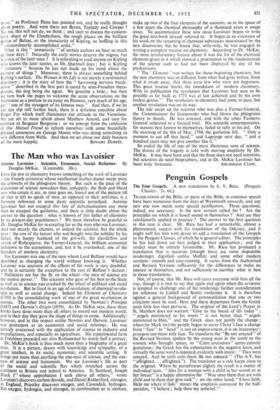- The Man who was Lavoisier
EVEN the tiro in chemistry knows 'something of the work of Lavoisier —the French aristocrat whose intellectual feather-duster swept away the cobwebs of the phlogiston theory. But such is the pace of the expansion of science nowadays that, unhappily, the flesh and blood men who create it are, as time goes on, forced out of the picture till all that is left to speak of men, as opposed to their activities, is a footnote reference to some dusty scientific periodical. Antoine Lavoisier has not escaped this fate of dehumanisation any more than he escaped the guillotine, and there is little doubt about the answer to the question : what is known of this father of chemistry by its present-day practitioners ? We must therefore be grateful to Dr. Douglas McKie for re-creating for us the man who was Lavoisier. And not merely the chemist, or indeed the scientist, but the whole man : the son of the lawyer who was\-bought into the nobility by his father, the happy husband of the girl-wife, the classfellow and victim of Robespierre, the Farmer-General, the brilliant economist unknown to the economists, and, lest it be overlooked, one of the founders of modern chemistry.
For Lavoisier was one of the men whom Lord Balfour would have described as changing the world without knowing it. Whether Lavoisier was unaware of the effects of his work is very doubtful, and he is certainly the exception to the rest of -Balfour's dictum " Politicians are but the fly on the wheel—the men of science are the motive power." The scientist who gave of his best to the State as well as to science was crushed by the wheel of political and social revolution. But he lived in an age of revolution, of chemical revolu- tion as well as social change. Indeed his Elements of Chemistry (1789) is the consolidating work of one of the great revolutions in science. The other two were consolidated by Newton's Principia (1687) and Darwin's Origin (1859). As Dr. McKie says, these three books have done more than all others to mould our modern world, and in their day they gave the shape of things to come. Additionally, however, and in this respect unlike Newton and Darwin, Lavoisier was prominent as an economist and social reformer. He was actively concerned with the application of science to industry-and manufactures, and especially,to agriculture. His experimental farm at Frechines preceded our own Rothamsted by nearly half a century.
Dr. McKie's book is thus much more than a biography of a great man. It is a picture, drawn with knowledge and sympathy, of a great intellect, in its social, economic, and scientific setting. It brings out more than anything the one-ness of science, and the one- ness of science and humanism. We see Lavoisier's life as part of the social and scientific flux which stretched across the continent to Britain and indeed to America. In Scotland, Joseph Black (" whose approbation I seek above all others," wrote Lavoisier) discovers carbon dioxide, and Daniel Rutherford, nitrogen; in England, Priestley discovers oxygen, and Cavendish, hydrogen. But oxygen, hydrogen, and nitrogen, in combination or in mixture, make up two of the four elements of the ancients, so in the space of a few years the chemical philosophy of a thousand, years is swept away. To accommodate these new ideas Lavoisier began to write the great text-book already referred to. It began as an extension of his work On the renaming of chemical substances necessitated by the new discoveries, but he found that, willy-nilly, he was engaged in writing a complete treatise on chemistry. According to Dr. McKie, the most revolutionary feature about it was the list of the chemical elements given in it which showed a penetration to the fundamentals of the science such as had not been displayed by any of his predecessors.
" The ' Elements ' was written for those beginning chemistry, but the new chemistry was so different from what had gone before, from what it swept away, that there were .few who were not beginners. This great treatise marks the foundation of modern chemistry. With its publication the revolution that Lavoisier had seen to be possible as far back as 1773 was at last achieved and by his own tireless genius." The revolution in chemistry had come to pass, but another revolution was on its way.
The tide swept up the scientist who was also a Farmer-General, the Commissioner for Gunpowder who had blown the phlogiston theory to shreds. He was arrested, and with. the other Farmers- General subjected to a farcical trial. His scientific contemporaries, for reasons best known to themselves, failed to rally to his aid. On the morning of the 8th of May, 1794, the guillotine fell. " Only a moment to cut off that head," said Lagrange next day, `,` and a hundred years may not give another like it."
So ended the life of one of the most illustrious sons of science. The drama of the tragedy is told with moving simplicity by Dr. McKie. It may have been said that the State does not need scientists, but scientists do need biographers, and in Dr. McKie Lavoisier has


































 Previous page
Previous page